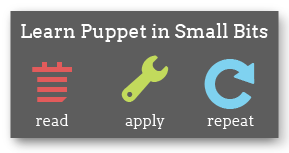Plugins in Modules
Learn how to distribute custom facts and types from the server to managed clients automatically.
Details
This page describes the deployment of custom facts and types for use by the client via modules.
Custom types and facts are stored in modules. These custom types and facts are then gathered together and distributed via a file mount on your Puppet master called plugins.
This technique can also be used to bundle functions for use by the server when the manifest is being compiled. Doing so is a two step process which is described further on in this document.
To enable module distribution you need to make changes on both the Puppet master and the clients.
Note: Plugins in modules is supported in 0.24.x onwards and modifies the pluginsync model supported in releases prior to 0.24.x. It is NOT supported in earlier releases of Puppet but may be present as a patch in some older Debian Puppet packages. The older 0.24.x configuration for plugins in modules is documented at the end of this page.
Module structure for 0.25.x and later
In Puppet version 0.25.x and later, plugins are stored in the lib directory of a module, using an internal directory structure that mirrors that of the Puppet code:
{modulepath}
└── {module}
└── lib
|── augeas
│ └── lenses
├── facter
└── puppet
├── parser
│ └── functions
├── provider
| ├── exec
| ├── package
| └── etc... (any resource type)
└── type
As the directory tree suggests, custom facts should go in lib/facter/, custom types should go in lib/puppet/type/, custom providers should go in lib/puppet/provider/{type}/, and custom functions should go in lib/puppet/parser/functions/.
For example:
A custom user provider:
{modulepath}/{module}/lib/puppet/provider/user/custom_user.rb
A custom package provider:
{modulepath}/{module}/lib/puppet/provider/package/custom_pkg.rb
A custom type for bare Git repositories:
{modulepath}/{module}/lib/puppet/type/gitrepo.rb
A custom fact for the root of all home directories (that is, /home on Linux, /Users on Mac OS X, etc.):
{modulepath}/{module}/lib/facter/homeroot.rb
A custom Augeas lens:
{modulepath}/{module}/lib/augeas/lenses/custom.aug
Note: Support for syncing Augeas lenses was added in Puppet 2.7.18.
And so on.
Most types and facts should be stored in which ever module they are related to;
for example, a Bind fact might be distributed in your Bind module. If you wish to centrally
deploy types and facts you could create a separate module just for this purpose, for example
one called custom. This module needs to be a valid module (with the correct directory structure and
an init.pp file).
So, if we are using our custom module and our modulepath is /etc/puppet/modules then types and facts would be stored in the following directories:
/etc/puppet/modules/custom/lib/puppet/type
/etc/puppet/modules/custom/lib/puppet/provider
/etc/puppet/modules/custom/lib/puppet/parser/functions
/etc/puppet/modules/custom/lib/facter
Note: 0.25.x versions of Puppet have a known bug whereby plugins are instead loaded from the deprecated plugins directories of modules when applying a manifest locally with the puppet command, even though puppetmasterd will correctly serve the contents of lib/ directories to agent nodes. This bug is fixed in Puppet 2.6.
Enabling Pluginsync
After setting up the directory structure, we then need to turn on pluginsync in our puppet.conf configuration file on both the master and the clients:
[main]
pluginsync = true
Note on Usage for Server Custom Functions
Functions are executed on the server while compiling the manifest. A module defined in the manifest can include functions in the plugins directory. The custom function will need to be placed in the proper location within the manifest first:
{modulepath}/{module}/lib/puppet/parser/functions
Note that this location is not within the puppetmaster’s $libdir path. Placing the custom function within the module plugins directory will not result in the puppetmasterd loading the new custom function. The puppet client can be used to help deploy the custom function by copying it from modulepath/module/lib/puppet/parser/functions to the proper $libdir location. To do so run the puppet client on the server. When the client runs it will download the custom function from the module’s lib directory and deposit it within the correct location in $libdir. The next invocation of the Puppet master by a client will autoload the custom function.
As always custom functions are loaded once by the Puppet master. Simply replacing a custom function with a new version will not cause Puppet master to automatically reload the function. You must restart the Puppet master.
Legacy 0.24.x and Plugins in Modules
For older Puppet release the lib directory was called plugins.
So for types you would place them in:
{modulepath}/{module}/plugins/puppet/type
For providers you place them in:
{modulepath}/{module}/plugins/puppet/provider
Similarly, Facter facts belong in the facter subdirectory of the library directory:
{modulepath}/{module}/plugins/facter
If we are using our custom module and our modulepath is /etc/puppet/modules then types and facts would be stored in the following directories:
/etc/puppet/modules/custom/plugins/puppet/type
/etc/puppet/modules/custom/plugins/puppet/provider
/etc/puppet/modules/custom/plugins/facter
Enabling pluginsync for 0.24.x versions
For 0.24.x versions you may need to specify some additional options:
[main]
pluginsync=true
factsync=true
factpath = $vardir/lib/facter

